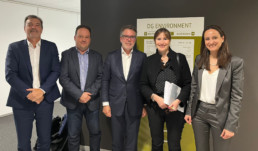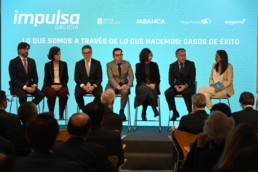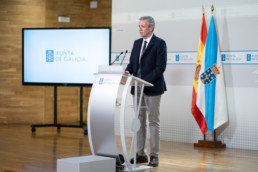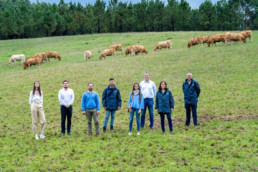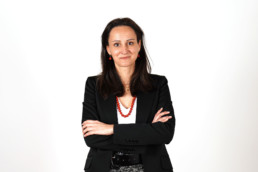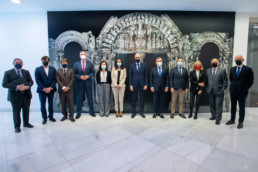Impulsa Galicia and Altri present the Palas de Rei sustainable textile fibre factory project in Brussels
The public-private company Impulsa Galicia and Altri, the industrial partner of one of its portfolio projects, presented to the European Commission the details of the project for the sustainable textile fibre factory in Palas de Rei.

The meeting was attended by Enyd López, General Director of Impulsa Galicia; on behalf of Altri, José Pina, CEO, and Carlos Van Zeller, vice-president of the executive committee; and on behalf of the European Commission, Emmanuelle Maire, head of the Circular Economy, Sustainable Production and Consumption Unit of the Environment Department, and José María Ramos Florido, from the Environment Directorate-General.
Those responsible for the project that will allow the production of sustainable textile fibres from certified wood of Galicia and textile waste explained the dimensions and the pioneering character of an initiative that will turn Europe into a benchmark of circular economy in the textile sector.
About the sustainable forest management project
It is a driving project based on the transformation of wood into textile fiber under the principles of sustainability and circularity. The vital cycle of wood in Galicia will be closed and 200,000 tons per year of sustainable textile fiber will be manufactured in the autonomous community, using certified wood from our forests as the main raw material, as well as textile waste. This is a pioneering initiative at European level, as it will integrate in a single process the production of pulp and fiber, in addition to the use of textile waste.
With an investment of more than 800 million euros, the centre is expected to create 2,500 direct and indirect jobs and generate synergies with other key sectors of the Galician economy, such as forestry and textiles. It is the only one of its kind currently planned in Europe.
The Portuguese paper company Altri is the chosen industry leader that will finance the design and development of the initiative until it reaches the point of investment. As the project progresses, Altri will explore partnerships with the entire value chain of the Galician forestry sector.
After announcing Palas de Rei as the site chosen to implement the manufacturing complex, Altri is moving forward with the environmental impact study, the engineering project, the economic feasibility, financing and access to EU funds. At present, more than a hundred engineers from different parts of the world are working on the project and the company has a permanent headquarters in the city of A Coruña, where there are a dozen employees.
On December 29, the President of the Xunta, Alfonso Rueda, announced the declaration of the project as a strategic industrial project for Galicia, a consideration aimed at facilitating its administrative processing.
Impulsa Galicia presents itself to Madrid's business and investment community
The Xunta de Galicia, Abanca, Reganosa and the directors of of the current driving projects promoters, give the keys to why the public-private partnership is a unique tool in Spain.
The main hall of the Casa de Galicia was too small for those who wished to attend the presentation of the company Impulsa Galicia in the Spanish capital. In it, entrepreneurs and investors had the opportunity to learn the value of this tool for the development of driving projects from the experience of all parties involved. Speakers included the president of the Xunta de Galicia, Alfonso Rueda; the First from the experience of all parties involved Vice-President of the Xunta de Galicia and President of Impulsa Galicia, Francisco Conde; the Chairman of Abanca, Juan Carlos Escotet; the General Manager of Reganosa and member of the Impulsa Galicia technical committee, Emilio Bruquetas; the General Manager of Capital Markets, Institutional Management and Distribution of Abanca and member of the technical committee of Impulsa Galicia, Juan Luis Vargas-Zúñiga; the CEO of Altri Group, José Pina; the Director of New Businesses of Naturgy, Silvia Sanjoaquín; the Director of Renewable Fuels of Repsol, Berta Cabello; the CEO of Ingenostrum, Santiago Rodriguez and the General Director of Impulsa Galicia, Enyd López.
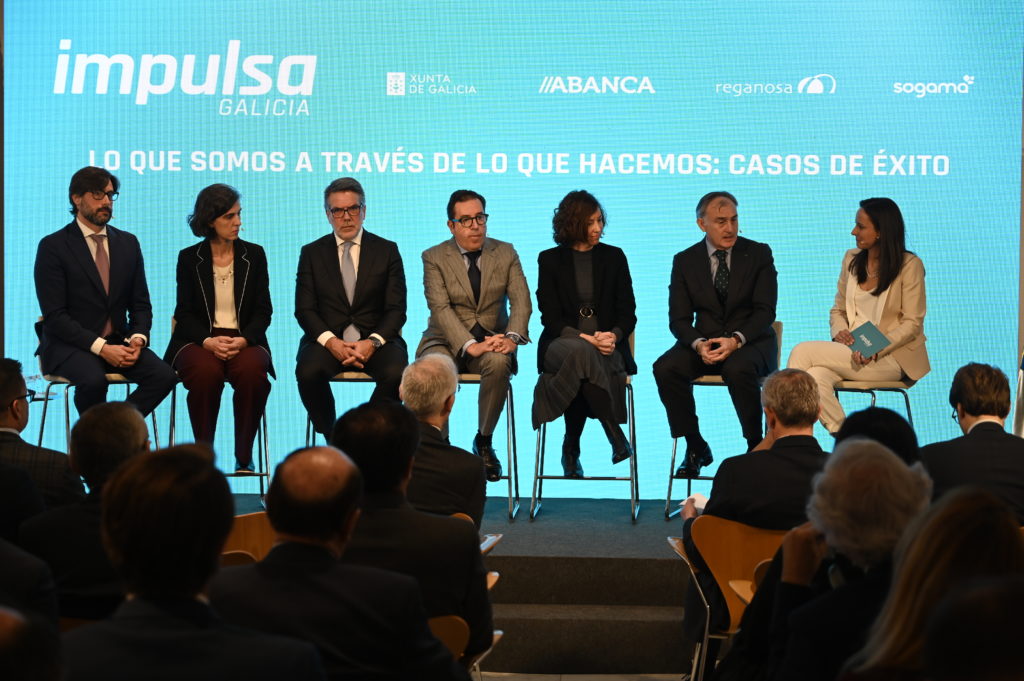
In his speech, the Chairman of Abanca, Juan Carlos Escotet, stressed that Impulsa Galicia has a characteristic that makes it exceptional: “it aspires to project itself over time. It was created to influence, under sustainability criteria, the development of an economic structure that is increasingly more productive, more competitive and more inclusive”.
For his part, the Vice-President of the Xunta de Galicia and President of Impulsa, Francisco Conde, assured those present that in Galicia “there is a deep interest in attracting investment towards the objective that we have from the point of view of economic policy, which is to commit to an industrial agenda in the 2030 horizon (...) Impulsa is situated in this context. It aims to be the platform for business initiatives that are the driving force behind this industrial agenda”.
Emilio Bruquetas and Juan Luis Vargas-Zúñiga, as members of the technical committee, briefly explained the origins of Impulsa and the nature of the projects underway. Both emphasised the circularity of the projects, not only because they are sustainable, but also because they are projects that will generate other projects, expanding into other sectors and attracting investment and talent from outside.
Investment such as that being made by the Portuguese company Altri in this initial phase of the start-up of a pioneering industrial complex for the production of textile fibres from certified Galician wood. José Pina, CEO of Altri, stated that one of the reasons for deciding to invest in this project was the support of the Administration through Impulsa Galicia.
In the same line, Berta Cabello of Repsol and Silvia Sanjoaquín of Naturgy, the companies promoting, together with Reganosa, the project to generate biogas and fertilisers from surplus livestock manure, stressed the importance of collaboration between the Administration and companies. In a project “unique for providing a solution for the whole territory” and within the framework of decarbonisation, they highlighted the great importance of collaboration between the Administration and companies. This was also confirmed by Santiago Rodríguez, CEO of Ingenostrum, the company that will lead the construction of a large data centre that will facilitate the digitisation of the business and institutional fabric of Galicia and make data storage and processing cheaper.
Finally, and to close the day, the President of the Xunta, Alfonso Rueda, encouraged those present to invest in Galicia and in its driving projects, because the current projects "have come to be a reality and although we are at the beginning of the road, this will open the doors to many other projects that we want to do in Galicia (...) Entrepreneurship in Galicia is worthwhile," he said.
Impulsa Galicia selects Ingenostrum as industrial partner for the implementation of a large data centre
The infrastructure offers up to 15 MW IT that would give the community sovereignty in the control of its data.
It would involve a total investment of 400 million euros and the generation of around 100 highly qualified direct and indirect jobs.
1 March 2023
The public-private company Impulsa Galicia, whose main objective is to contribute to the transformation of the Galician economy, has selected Ingenostrum as an industrial partner to begin analysing the feasibility of a large data centre. This infrastructure would represent a turning point in the digitisation of the business and institutional fabric of the autonomous community. This was communicated by those responsible for the project to the President of the Xunta de Galicia, Alfonso Rueda, at a meeting held this afternoon at the headquarters of the Galician Government, attended by Francisco Conde, First Vice-President of the Xunta and President of Impulsa Galicia; Miguel Corgos, Regional Minister of Finance of the Xunta and member of the technical committee of Impulsa Galicia; Juan Luis Vargas-Zúñiga, General Manager of Capital Markets, Management and Institutional Distribution of ABANCA and member of the technical committee of Impulsa Galicia; Enyd López, General Director of Impulsa Galicia; Santiago Rodríguez, CEO of Ingenostrum and David Gómez, Deputy General Manager of Ingenostrum.
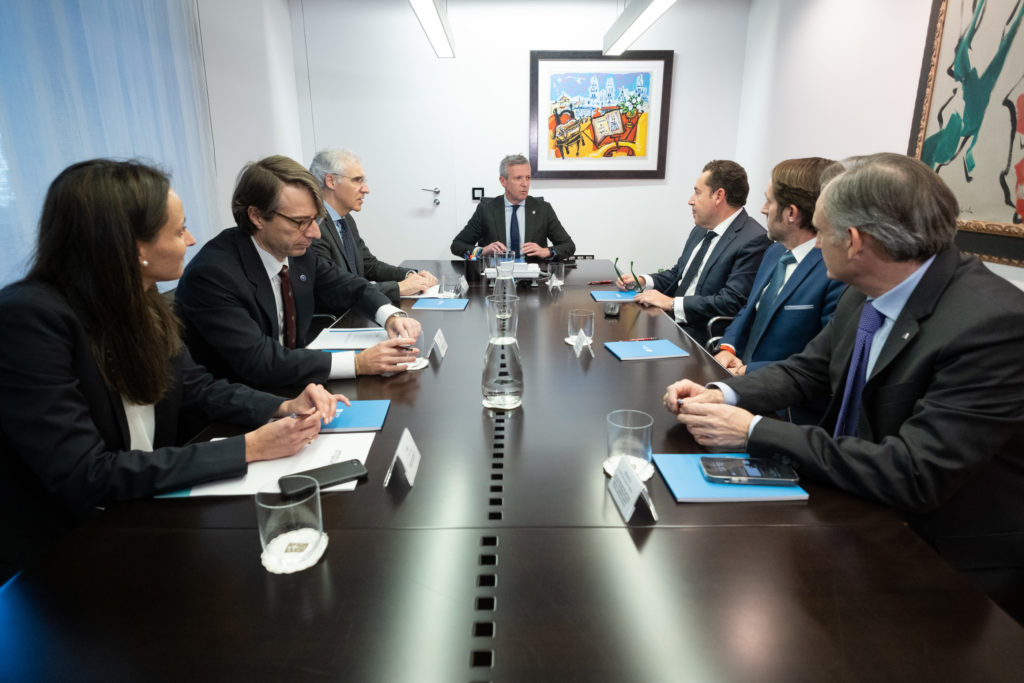
The objective of the project for the construction and implementation of a large data centre, in line with the National Recovery, Transformation and Resilience Plan, is the modernisation and digitisation of the Galician business fabric. This project seeks to provide Galician SMEs, large companies and public institutions with a technological solution that guarantees the data storage they need, high-speed connectivity, sufficient bandwidth and low latency (temporary delays within a network), thus facilitating the digitisation of SMEs by offering services that they would not be able to obtain today on the market, ensuring economies of scale and cost efficiencies. In addition, it would allow the establishment of synergies with projects already underway in Galicia.
The planned 15MW IT capacity would allow hosting the data of the vast majority of Galician companies, which would give Galicia sovereignty over the control of the community's data.
Over the last year, Impulsa Galicia carried out the conceptualisation and design of the project and the search for an investment partner and promoter. The Spanish company Ingenostrum has been chosen to lead the project, and will go hand in hand with the engineering firm Nexitic, specialised in the design of this type of infrastructure.
A total investment of EUR 400 million is estimated, of which EUR 130 million would be devoted to the construction itself and the remaining EUR 270 million would be invested in the information technology (IT) servers.
Around 200 jobs would be generated during the construction period, which in this type of infrastructure usually lasts for a year, and afterwards, around 100 highly qualified jobs would be created for its maintenance, both direct and indirect.
The General Director of Impulsa Galicia, Enyd López, stressed that “the data centre is one of the projects included in the Galician Transformation Hub, with which we are making progress in achieving a digital and sustainable economic model. We developped an innovative idea, we turned it into a driving project and we found a technologist and investor for it to prosper outside our umbrella”. We are very satisfied,” she added, “to find a solid partner and also to articulate everything that lies ahead as a national project, the result of public-private collaboration and which will serve the whole of Galician society, making us leaders in digitization”.
According to Santiago Rodríguez, CEO of Ingenostrum: “This is a very exciting project for Ingenostrum because it consolidates us as a leading company in the conceptualisation of data centres. We are confident that this initiative will be a boost for the data centre sector in our country and will help us to establish ourselves as the new technological hub of Europe”.
The project for the sustainable management of Galician forests, whose industrial promoter is Altri, declared by the Xunta de Galicia as strategic
Rueda points out that it is a "unique initiative in Europe" that integrates plants and pulp and lyocell and urges the government to clarify whether it will access European funds.
He stresses that the market for sustainable cellulosic fibres has a high growth potential because "they are more environmentally friendly than artificial fibres" and are increasingly in demand in the sector.
With an investment of more than 800 million euros, the initiative plans to produce up to 200,000 tonnes of lyocell per year.
The President of the Xunta de Galicia, Alfonso Rueda, announced the declaration of the project for the sustainable management of Galician forests, which includes the start-up of Altri's textile fibre factory in Palas de Rei (Lugo), as a strategic industrial project for Galicia. The initiative, the only one of its kind in Europe and part of the Galician Transformation Hub, has been given this status in order to facilitate its administrative processing. "It is an innovative and ambitious project to produce lyocell, a high quality fabric, more environmentally friendly than artificial fibres and increasingly demanded by the textile industry worldwide", Rueda stressed, who emphasised that "there is no similar project planned in Europe".
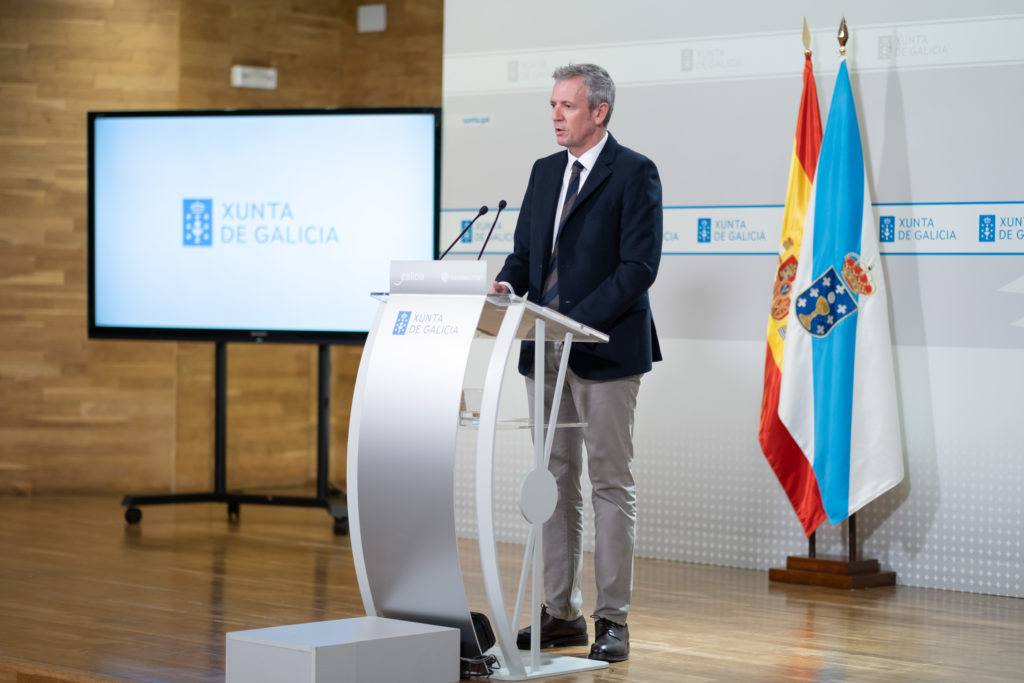
"With an investment of more than 800 million euros, the centre is expected to create 2,500 direct jobs and generate synergies with other key sectors of the Galician economy, such as forestry and textiles," said the president. It is oriented to the production of textile fibres with the forecast of achieving 200,000 tons per year of lyocell, a high quality fabric that has a growing implantation in the textile industry for representing an ecological alternative to artificial fibres of fossil origin.
The factory project to be installed in Palas de Rei is the only one of its kind currently planned in Europe and integrates the pulp and lyocell plants, as well as favouring synergies with other initiatives under development in the Galician ecosystem. It is expected to have a dynamising impact on the area by prioritising the hiring of local workers, thus contributing to the objective of setting the population in rural areas.
The declaration as a strategic industrial project is in line with the philosophy of the Law of administrative simplification and support for the economic reactivation of Galicia, which seeks to attract investment. It will allow the reduction by half of the deadlines - except those relating to the submission of applications and appeals - while maintaining the technical, legal and environmental guarantees.
The plant meets all the requirements to be a strategic industrial project, as it exceeds the minimum investment of 20 million euros and the creation of at least 100 jobs - Altri expects to generate 2,500 direct jobs - . It also meets the requirement that the initiatives must complement value chains, belong to strategic sectors or be aligned with the objectives of the European Union or be integrated into the NextGeneration funding.
Impulsa Galicia presents itself in front of Galician society as the optimal tool to gain investments and carry out strategic projects
The dissemination session count on the presence of Alfonso Rueda, Francisco Conde, Juan Carlos Escotet and the representative from society’s executive committee, as well as representatives from two of the most advanced projects: one about the sustainable management of Galician forests and other about circular economy
November 8th, 2022.
Impulsa Galicia, the private-public partnership created for the development of strategical projects, was presented in front of a well-stocked representation of Galician’s society as an optimal tool, unique in Spain, for investment channelling and the articulation of strategic projects worthy of European funds. In one of its dissemination sessions organized in Santiago de Compostela, representatives of its shareholders attended, both public and private, and the promoters of the main projects underway: the sustainable management of Galician forests and the circular economy.
Created in April of 2021 by the Xunta de Galicia (40%), Abanca (38%), Reganosa (12%) and Sogama (10%), Impulsa Galicia has been entrusted with the development of business initiatives that have an impact on the dynamization, progress and transformation of Galician economy through a green and digital model. It was created with the aim of encouraging productive activity in the autonomous community by attracting investment, incorporating partners and collaboration between public and private institutions for the subsequent implementation and consolidation of business proposals.
This was stated by Francisco Conde, president of Impulsa Galicia, in his welcome speech. He emphasized that this company was created with the aim of contributing to the green and digital transformation of the Galician business network. "It is an opportunity to transform the industrial network from innovation and sustainability, creating quality employment," said the first vice-president of the Government of Galicia.
For his part, the president of Abanca, Juan Carlos Escotet, in his speech on behalf of the private shareholders of Impulsa Galicia, reaffirmed the bank's commitment to facilitate access to European funds, attract new investors and show that Galicia "is a land of opportunities".
The conference also included a round table discussion between two members of the company's executive committee, Emilio Bruquetas, general manager of Reganosa, and Juan Luis Vargas-Zúñiga, general manager of Capital Markets, Management and Institutional Distribution of Abanca, moderated by the company's general manager, Enyd López. In it, Emilio Bruquetas emphasized that the projects in the portfolio had their origin in the Polo para la Transformación de Galicia, which arose to get out of the crisis caused by the pandemic sooner and better. There, a series of strategic tractor projects for the Galician economy and interconnected with each other were identified. "They are projects that take advantage of the competitive advantages that Galicia has, that generate inputs and outputs among all of them, and we are sure that there are many more that can be part of this ecosystem," said Bruquetas.
Along these lines Vargas-Zúñiga insisted: "There was a first phase of ideas and now we must promote other projects where other entrepreneurs participate, where we attract a qualified population". He guaranteed that they have the capacity to make financing reach the companies in a "faster and more efficient" way. And he claimed Impulsa Galicia as a facilitator of economic resources flowing for strategic projects such as the creation of a large data centre based in Galicia, "which can generate new jobs and a differentiating productive network". "Impulsa belongs to Galician people and its doors are open to entrepreneurs, so that an idea can come and we can conceptualize it," he said.
In a second table, also moderated by the general manager of the company, two of the great projects already known were detailed without much significance. On the one hand, the vice-president of Altri's executive committee, Carlos Van Zeller, the company behind the project for the sustainable management of Galician forests consisting of the start-up of a sustainable textile fiber factory in Palas de Rei, explained that there are currently 100 engineers working on the design of the textile complex and that all the permits and licenses are being processed. "The critical point is, undoubtedly, the funding", he stated, "we held up to five meetings with the Spanish Government and it is urgent to know if European funds will be allocated to this project, which should have a particular PERTE due to the volume of investment required".
On the other hand, Silvia Sanjoaquín, director of New Businesses of Naturgy, and Natalia Barreiro, director of the Repsol industrial complex in A Coruña, delved into the circular economy project that will use the surplus of bovine, pig and poultry slurry to produce biogas and fertilizer. They highlighted the public-private collaboration as key to the development of this project, which they affirm "is unique in Spain and Europe" and "generates quality employment in the framework of the energy transition in sparsely populated areas". The biogas produced will make it possible to "decarbonize Galician transport, homes and industry".
Finally, the president of the Xunta de Galicia, Alfonso Rueda, closed the day, stating that the initiatives developed under Impulsa Galicia together add up to "millions of euros of investment and the expected generation of thousands of jobs". "They are viable, realistic projects, and they can be a happy reality and a source of wealth for Galicia", he declared. He also reclaimed the involvement of the central government, through the European funds, for the attainment of financing of these projects. "From here we did exactly everything that was demanded from Brussels and Madrid", he guaranteed.
The Xunta highlights that the circular economy centre will increase Galicia's energy autonomy and job opportunities, especially in rural areas
The first Vice-president and Regional Minister of Economy, Industry and Innovation, Francisco Conde, and the Regional Minister for the Rural Environment, José González, held a meeting with representatives of Reganosa, Repsol and Naturgy, accompanied by the general director of Impulsa Galicia, Enyd López.
The First Vice-President and Regional Minister of Economy, Industry and Innovation, Francisco Conde, and the Regional Minister for the Rural Environment José González, held a meeting this morning with Reganosa, Repsol and Naturgy, which, together with Impulsa Galicia and the Xunta, are promoting the future circular economy centre for the production of biogas and fertilisers from livestock waste.
According to Conde, this initiative will increase Galicia's energy autonomy and employment opportunities, especially in rural areas, and demonstrates how public-private collaboration enables the generation and development of proposals that improve Galicia's industrial capacities.
The project, which will cost 146 million euros in the first phase, stands out for its innovative component, its environmental benefits, its support for rural areas, and for being framed within the challenge of energy transition. The initiative would cover 7% of Galicia's demand for imported natural gas with biomethane.
In this regard, the economic vice-president of the Xunta highlighted the role played by the company Impulsa Galicia. Together with Altri, this is the second project to be matured and developed under the auspices of this public-private entity created with the function of identifying proposals and consolidating them as viable initiatives.
Thus, the circular economy project is the result of many months of previous work, and the forecast of the promoting partners is to start the basic engineering work next November. This is one of the major proposals with which Galicia is applying for European Next Generation funds, and for this reason, the Xunta hopes that once and for all the Government will show its involvement with this project, which is also one of the projects selected to participate in the calls for proposals of the Just Transition Fund.
For his part, the Regional Minister for the Rural Environment, José González, stressed that this circular economy project, which seeks to transform surplus slurry and other waste into biomethane and organic fertilisers, will guarantee at all times the availability for livestock farmers of the livestock excrement needed to fertilise their land in a sustainable way, as well as the economic viability of their farms.
In his speech, José González specified that the first anaerobic digestion plant to produce renewable gas from surplus bovine, pig and poultry excrement mixed with other waste from the agri-food sector is to be installed in Meirama. In the first phase, five pre-treatment centres associated with this plant will be set up in the provinces of A Coruña and Lugo, taking into account the distribution of Galician farms, with the idea of extending the circular economy project to Ourense and Pontevedra, thus establishing a comprehensive network for the treatment of surplus livestock excrement, bringing the initiative closer to the places where there are livestock farms.
The Regional Minister for the Rural Environment added that the implementation of this initiative would also contribute to compliance with the new European environmental legislation on the protection of agricultural land and effluent control, as well as sustainable nutrition of agricultural land, and would provide a solution to recurring issues in the management and storage of livestock excretions.
The Regional Minister also highlighted the collaboration of the sector in carrying out this initiative, pointing out that he will shortly begin a round of meetings with cooperatives, livestock associations and agricultural organisations to explain the project to them, always seeking the viability of Galician farms.
Reganosa, Repsol and Naturgy collaborate with Impulsa Galicia in the promotion of a project to transform surplus slurry and other waste into biomethane and organic fertilizers
In an initial phase, once the required administrative authorizations have been obtained, the three energy companies would invest 146 million euros to generate 300 GWh of renewable energy annually with 1.2 million tons of livestock manure
The first production plant of this programme is planned in Meirama, with five pre-treatment centres associated
The initiative would make it possible to reduce external energy dependence and develop the circular economy in the autonomous community. In its full deployment, it would avoid the emission of 500,000 tons of CO2 equivalent per year and up to 600 direct and 1,900 indirect jobs would be created
The companies thus contribute to decarbonising Galician transport, industry and agri-food activity
The project has been presented to four central government ministries with the aim of fitting it into Next Generation funds
28 September 2022
Reganosa, Repsol and Naturgy collaborate with Impulsa Galicia to develop the circular economy with a project that would transform surplus livestock manure and other waste on a large scale into biomethane, organic fertilizers and CO2 neutral of biological origin. This initiative has been designed to optimise slurry management in the autonomous community, reduce energy dependence on the outside, facilitate compliance with new European standards and help decarbonise industry, households and mobility. The promoters are currently carrying out fieldwork and trials that give continuity to months of previous studies and research.
The project consists of progressively deploying throughout the territory a network of plants that value surpluses of bovine, porcine and poultry slurries mixed with a smaller amount of FORS (organic fraction of separate collection) and RIO (organic industrial waste) of the agri-food sector for the production of renewable energy. This is reflected in the memorandum of understanding that Reganosa, Repsol and Naturgy have recently signed with Impulsa, the mixed society promoted by the Xunta de Galicia with the aim of accompanying business initiatives that affect the dynamization, progress and transformation of the Galician economy through a green and digital model.
In an initial phase, the three energy companies plan to build a first anaerobic digestion plant that produces renewable gas and five pre-treatment plants associated with it to dehydrate the surplus bovine slurry. The renewable gas generation plant would be located in Meirama (Cerceda), a fair transition zone, while the five pretreatment plants would be divided, in a first phase, by municipalities in the same province of Coruña and Lugo, according to a distribution based on the Galician map of livestock farms, thus optimizing logistics between both types of facilities.
With an investment of approximately 146 million euros, in this first phase, 1,240,000 tons of surplus slurry would be treated annually and, in addition to organic fertilizers and CO2 neutral, about 300 gigawatts per hour (GWh) of biomethane would be produced and injected into the natural gas network. This renewable gas would be used to decarbonize different sectors, such as transport, residential and industrial, and could be used in the processes of the Repsol refinery in A Coruña.
Extension to all Galicia
Once this initial phase has been completed, the promoters intend to extend the circular economy project in the future to the whole of Galicia, implementing a centralised network for the treatment of surplus livestock manure. This system will ensure the availability to livestock farmers of the slurry necessary to sustainably fertilise their land, as well as the economic viability of their farms. The developers' calculations show that around 6 million tonnes of waste could be recovered each year. Rounding off, the biomethane produced (1 TWh per year) would be equivalent to 7% of the natural gas imports that are now demanded in Galicia, with which the community would substantially advance in its energy autonomy and in the consumption of renewables. The project has been submitted to four ministries of the central Government (Economy, Ecological Transition, Agriculture and Industry) with the aim of fitting it into the Next Generation funds, both for its circularity component and for the fact that it provides a green and indigenous energy source from the surplus of livestock manure.
In this way, the global project would also avoid the emission into the atmosphere of about 500,000 tons of CO2 per year and create quality jobs in the context of the ecological transition and in sparsely populated areas. In short, just over 600 direct and 1,900 indirect jobs, considering both the operation of the plants and transport logistics.
The implementation of this initiative would contribute to compliance with the new European environmental legislation on the protection of agricultural soil and effluent control, as well as sustainable nutrition of agricultural soil, and would address recurrent issues in slurry management and storage.
Innovative for its concept of global integration in the face of dispersion, this project exemplifies at the same time the new model of public-private cooperation and between companies in the same sector, being open to the participation of other companies.
"The parties involved in this project have worked very intensively to provide a solvent technical solution; now we need to create the regulatory framework that allows us to develop and implement the advances," said Reganosa CEO Emilio Bruquetas, who calls for policies that encourage "in a clear way" the production of biogas in Spain.
The director of Renewable Fuels of Repsol, Berta Cabello, for her part, has indicated that "with this project, strategic for Repsol, we promote the reduction of greenhouse gas emissions from transport and industry, we increase the energy autonomy used renewable gases obtained with local resources and at the same time we promote the circular economy and the sustainability of such an important sector in our country as livestock".
The general director of Renewables, New Businesses and Innovation of Naturgy, Jorge Barredo, stressed that "this biomethane production project will boost the energy transition in Galicia and promote sustainable waste management, taking a step forward towards the circular economy and local socio-economic development, in addition to contributing to reduce energy dependence from abroad".
“This,” said Impulsa CEO Enyd López, “is a very relevant project for Galicia. In its conception and support, the Xunta has advanced twofold: on the one hand, favouring an agile decarbonisation of the economy, and on the other, making it easier for livestock farmers to comply with the regulations that will come from Europe. “And she added: "In addition to promoting the circular economy in isolation, this initiative will help generate an ecosystem of solid projects within the Pole for the Transformation of Galicia."
Expert in circular economy to lead Impulsa Galicia, a public-private entity established to help develop strategic projects in Galicia
Two others will also work alongside Enyd López on the organisation’s board of directors: Amparo Alonso, an expert in artificial intelligence, and Rosa María Sánchez-Yebra, the vice-governor of the Council of Europe Development Bank.
Santiago de Compostela
July 12, 2021
Enyd López Fernández, a chemical engineer who holds a degree in chemistry from the University of Santiago and who is also an expert in circular economy, is the new head of Impulsa Galicia, the Galician Association for the Development of Strategic Projects. The organisation is a joint venture that was established in April by the Xunta, Abanca, Reganosa, and Sogama with the goal of modernising Galicia’s economy by applying the fair, green, and digital transition model. Its main objective is to help develop strategic initiatives for Galicia. Amparo Alonso Betanzos, an expert in artificial intelligence, and Rosa María Sánchez-Yebra, who specialises in fiscal policy, will also join the organisation’s board of directors.
Enyd López was chosen by the board to be managing director of the organisation. Until recently, López was the head of Galicia Saica Natur, a part of Grupo Saica that focuses on the circular economy and waste management. She has also led several teams, divisions, and delegations for Grupo Saica throughout Spain.
Two more women have also been appointed to the board. Amparo Alonso is a professor of Computer Science at the University of A Coruña, as well as the president of the Spanish Association of Artificial Intelligence and a member of the Artificial Intelligence Advisory Council.
Rosa María Sánchez-Yebra is the vice governor of the Council of Europe Development Bank. She has also sat on the boards of the Banco de España and the National Securities Market Commission and was the secretary-general of the Spanish Treasury and Department of Fiscal Policy.
Impulsa Galicia is established with the goal of assisting with the development of strategic plans in Galicia
Francisco Conde, the Xunta’s Deputy Vice President and Minister for the Economy, Business, and Innovation, was joined by the Treasurer and Minister for Public Administration, Valerio Martínez, and the Minister for Rural Affairs, José González, at the organisation’s inaugural meeting today
The board has nine members, including its president Francisco Conde and vice president Francisco Botas, who is also the managing director of Abanca
With a social capital of 5 million euros provided by the Xunta, Abanca, Reganosa, and Sogama, Impulsa Galicia is now open to forming new partnerships
Santiago de Compostela
May 3, 2021
Francisco Conde, the Vice President for Economic Affairs and the Minister for the Economy, Business, and Innovation, was joined by Valeriano Martínez, the Minister for the Treasury and Public Administration, and José González, the Minister for Rural Affairs, at the inaugural meeting of Impulsa Galicia, the Galician Association for the Development of Strategic Projects. The organisation will assist in the development of initiatives included in the nominations for the Pole for the Transformation of Galicia.
It is anticipated that this pole will mobilise more than 3 billion euros in the first three years. It includes eight initiatives that could potentially lead to Galicia producing green hydrogen, a factory that converts cellulose into textile fibres, a waste treatment centre for the production of biogas, the expansion of renewable energy, and a boost to industrial digitalisation.
Impulsa Galicia will therefore focus on ideas that have the potential to transform their sector and that have an impact on production, employment, and the region itself, while also having a “tractor” effect on the production network with the ultimate goal of boosting the digital and ecological transformation of the autonomous community.
One of the organisation’s priorities will be to improve the capillarity and the multiplier effect of this funding, with SMEs at the centre of this strategy. It will assist in the search for investors for the development of projects and provide consulting services to improve the professionalism and consolidation of new businesses, including legal, financial, administrative, commercial, industrial, and management support. The organisation will act as a driving force and evaluate projects in accordance with their impact on value chains in production sectors.
Impulsa will improve Galicia’s chances when it comes to securing the Next GenerationEU funding. The autonomous community currently has 354 initiatives with the potential to mobilise 20 billion euros in investment. The ideas are based on three key principles: including SMEs; making R+D a transversal concept; and fostering collaboration between the public and private sectors.
Impulsa has 5 million euros of founding capital behind it, with 40% provided by the Xunta de Galicia, 38% provided by Abanca, 12% provided by Reganosa, and 10% by Sogama, and is open to forming new partnerships. The board has nine members: the office of president will be held by Francisco Conde. Francisco Botas, the managing director of Abanca, will serve as vice president. The other board members are Galician government ministers Valeriano Martínez and José González; the CEO of Reganosa, Emilio Bruquetas; board secretary and director of corporate governance and legal affairs at Abanca José Eduardo Álvarez-Naveiro; former president of the Xunta and Professor of Applied Economics at the University, Fernando González-Laxe; and Professor of Applied Economics at the University of Vigo, Santiago Lago Peñas. Eduardo Cortizo, the Head of Legal Advice at Abanca, will serve as board secretary.
The Xunta, Abanca, Reganosa, and Sogama form a new public-private organisation that will support “tractor effect” projects in Galicia
The Galician Association for the Development of Strategic Projects, AKA Impulsa Galicia, has been established to assist in developing business ideas that would have the best leverage effect for the Galician economy
It will foster the transformation of the economy using a ‘green’, digital model and attract investment, forging partnerships, and fostering collaboration between different institutions, with a special focus on SMEs
Its first objective is to support the development of projects that form part of the Galician nominations for the Next GenerationEU funding and to help them find future investors
Santiago de Compostela
April 28, 2021
The Xunta de Galicia, Abanca, Reganosa, and Sogama have formed a new public-private organisation that will support business ventures with the tractor effect that are using environmentally friendly and digital models to contribute to the stimulation, progress, and transformation of the Galician economy.
The Galician Association for the Development of Strategic Projects, AKA Impulsa Galicia, was established with the goal of encouraging production activity in our community by attracting investment, forging partnerships, and fostering collaboration between public and private institutions with a view to launch and consolidate new businesses ideas
This new entity will prioritise SMEs, ensuring that they are the main beneficiaries of these new “tractor effect” projects that will generate economic activity and value chains. It will also provide consulting services to improve the professionalism and consolidation of new business initiatives, including legal, financial, administrative, commercial, industrial, and management support.
The organisation will act as a driving force behind new initiatives, not an investor. It has a majority private ownership and is open to new collaborative opportunities. It has a founding capital of 5 million euros, with 38% provided by Abanca, 12% provided by Reganosa, and 10% provided by Sogama, making up 60% of the total. The Xunta de Galicia provided the remaining 40%.
During this initial phase, Impulsa Galicia will have one main goal: to assist in developing strategic projects with the potential to have a tractor effect that have been included in Galicia’s nominations for the Next GenerationEU funding, before helping these projects to find investors for further development.
Galicia currently has 354 projects (247 public, 107 private) vying for the funding, which could result in 20 billion euros being invested in the region.
Galicia’s candidacy includes initiatives for SMEs that could affect the entire industrial value chain. It would also support strategic sectors in Galicia to turn them into magnets that attract the rest of the community’s production network, with special attention being paid to SMEs and self-employed people.



